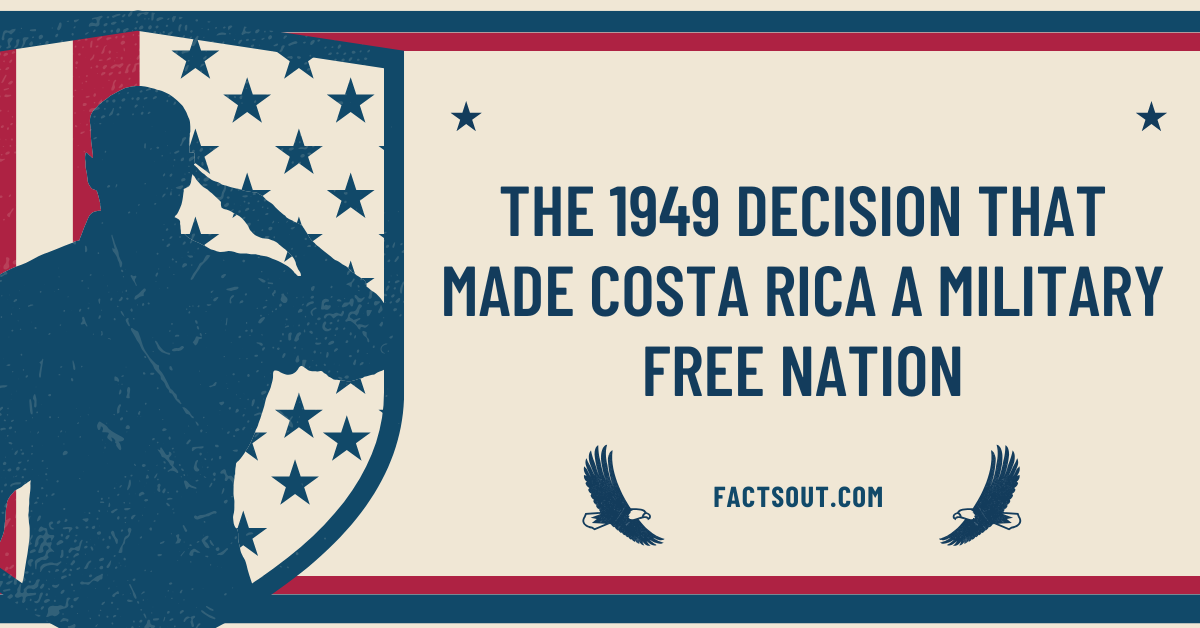In a world where nations compete over military might and defense budgets often outsize education and healthcare spending, one tiny Central American country chose the road less traveled — and walked it peacefully for over seven decades.
Welcome to Costa Rica, the land of lush rainforests, sloth selfies, and… no military.
Yes, you read that right. Since 1949, Costa Rica has proudly lived without an army — by constitutional choice. It’s one of the only countries in the world to do so, and remarkably, it hasn’t just survived — it has thrived.
But how did this tiny tropical nation take such a bold step? And what does it say about power, peace, and possibility in the modern world?
🎖️ The Military That Was — and the Civil War That Changed Everything
Let’s rewind to 1948, a year that turned the country’s future upside down — or rather, right-side up.
🇨🇷 The Short but Impactful Civil War
- In March 1948, a disputed presidential election between Rafael Ángel Calderón Guardia and Otilio Ulate Blanco threw the country into political chaos.
- Violence erupted after incumbent officials annulled the election results.
- José Figueres Ferrer, a coffee grower and philosopher-turned-revolutionary, led the National Liberation Army in what became a 44-day civil war — the bloodiest in Costa Rica’s 20th century.
⚔️ Casualties: Around 2,000 people — in a country with just over a million citizens at the time.
But out of this chaos came something truly unprecedented.
📜 The Bold 1949 Constitution: Goodbye Guns, Hello Books
After winning the civil war, José Figueres Ferrer took control — but instead of becoming a dictator or building a bigger army, he did the unthinkable.
👉 On December 1, 1948, Figueres abolished the military, literally smashing down the walls of the army headquarters in San José.
🎤 His words that day?
“The army is a thing of the past. We are going to replace it with an army of teachers.”
A year later, the decision was enshrined in the new Costa Rican Constitution of 1949:
📝 Article 12: “The army as a permanent institution is abolished.”
Costa Rica officially became a military-free nation.
🌍 A Global Anomaly: Who Else Has Done It?
Very few countries have taken the same path. Some examples:
| Country | No Military Since | Notes |
|---|---|---|
| Costa Rica | 1949 | Constitutionally abolished |
| Panama | 1990 | After U.S. invasion; has a public force |
| Iceland | No standing army ever | Relies on NATO agreements |
| Liechtenstein | 1868 | Disbanded after Austro-Prussian War |
| Vatican City | 1929 | Swiss Guard for protection |
But Costa Rica stands out because it’s not landlocked, not protected by a larger power, and still very politically active in international diplomacy.
📈 Peace Pays Off: Where Did the Budget Go Instead?
Without defense spending, Costa Rica redirected funds into:
🎓 Education
- Literacy rate: Over 97%
- Free public education through high school
🏥 Healthcare
- Universal health system (Caja Costarricense de Seguro Social)
- Ranked higher in health care than the U.S. by the WHO (World Health Organization)
🌳 Environment
- Over 25% of its land is protected nature reserves.
- Generates 98% of electricity from renewable sources.
- Aims to be carbon-neutral by 2050.
📊 Military budget savings? Estimated to be over $1.5 billion USD redirected over decades into social programs.
🕊️ Diplomacy Over Defense
Costa Rica hasn’t shied away from geopolitics. It’s been a vocal advocate for peace and international law, even hosting important global events:
- Headquarters of the Inter-American Court of Human Rights
- Home to the University for Peace, established by the United Nations
- Led campaigns for nuclear disarmament and climate justice
Former president Óscar Arias Sánchez even won the Nobel Peace Prize in 1987 for negotiating peace in Central America’s civil wars.
🇨🇷 But Is It Safe Without a Military?
This is the question everyone asks.
The answer? So far, yes.
Costa Rica does have:
- A national police force
- Border patrol units
- A coast guard
But these are strictly for internal security, not warfare. The country has faced minor border skirmishes (notably with Nicaragua in 2010) but has resolved conflicts diplomatically — often through the International Court of Justice.
🔐 Costa Rica’s philosophy? “Security through democracy, education, and law.”
🧠 Cultural Impact: A Peaceful Identity
Being a nation without an army isn’t just a political decision — it’s part of Costa Rica’s national identity.
- “Pura Vida” isn’t just a greeting; it’s a mindset — “Pure Life,” free of fear and aggression.
- Costa Ricans grow up learning about peace, diplomacy, and civic responsibility.
- Trust in institutions is comparatively high, and political violence is virtually nonexistent.
It’s no wonder Costa Rica consistently ranks as one of the happiest countries in the world.
✈️ The Tourism Factor
Costa Rica’s peaceful image has made it a top global destination for eco-tourism, honeymooners, digital nomads, and retirees.
🌟 Fun Tourism Facts:
- Over 3 million tourists visit annually — in a country of just 5 million!
- It has more biodiversity per square kilometer than the Amazon Rainforest.
- Its “no army” policy is a selling point in tourism campaigns.
📚 What the World Can Learn
Costa Rica’s journey shows us that security doesn’t have to mean militarization.
💡 Instead of soldiers, Costa Rica has invested in:
- Teachers instead of generals
- Diplomats instead of drones
- Biodiversity instead of bombs
It’s a model that challenges assumptions in global politics — proving that peace isn’t weakness. Sometimes, it’s the ultimate strength.
🧭 Final Thought
As the world grapples with rising tensions, conflict, and ballooning defense budgets, Costa Rica stands like a quiet rebel — an unlikely superhero in the cape of constitutional pacifism.
It dares to ask: What if the best defense… is no offense at all?
And it has 75 years of peace to back it up.



